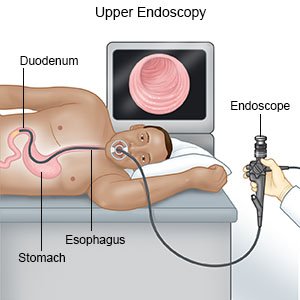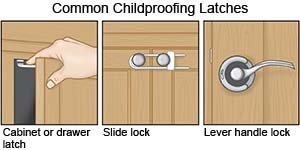Corrosive Esophagitis in Children
Medically reviewed by Drugs.com. Last updated on Apr 6, 2025.
What is corrosive esophagitis?
Corrosive esophagitis is damage to your child's esophagus from harmful substances. The damage may cause inflammation, ulcers, or scarring.
 |
What increases my child's risk for corrosive esophagitis?
- Swallowing strong chemicals, such as detergents, dishwashing liquid, or drain cleaners
- Certain medicines, such as antibiotics or pain medicines
- Pills that get caught in your child's throat if he or she has a narrow esophagus or does not swallow enough liquid with the pills
- Radiation therapy to kill cancer cells
- Certain conditions that cause your child's esophagus to narrow or the muscles not to work correctly
- A dry mouth condition that causes less saliva to be made
- Heart problems that cause your child's heart to get bigger and press on his or her esophagus can make the opening smaller
What are the signs and symptoms of corrosive esophagitis?
- Chest pain that is sudden or happens after your child takes a pill
- Pain when your child swallows liquids or food
- Loss of appetite
- Vomiting blood
How is corrosive esophagitis diagnosed?
Your child's healthcare provider will ask about your child's symptoms and other health problems. He or she may ask which pills your child has taken or treatments he or she received. He or she may ask if your child swallowed any harmful liquids. Your child may need one or more of the following:
- A barium swallow means your child swallows a thick liquid called barium. Barium helps your child's intestines show up better in x-ray pictures.
- Endoscopy is a procedure used to see the inside of your child's esophagus and stomach. A flexible tube with a small light and camera on the end are used. Your child's healthcare provider will look for any bleeding, lumps, narrowing, scars, tears, or pill pieces. He or she may take a small amount of tissue from your child's esophagus to be tested.

How is corrosive esophagitis treated?
Your child's healthcare provider may have you stop certain medicine or treatments for a period of time. This will give your child's esophagus time to heal. Do not stop any treatments without talking to the provider first. Your child may also need the following, depending on his or her age and the esophagitis cause:
- Medicines may be given to decrease inflammation or irritation from stomach acids. They may help increase the protective lining of the esophagus to help it heal. Your child may also need antibiotics to treat or prevent a bacterial infection in his or her esophagus.
- Dilatation is a procedure used to widen the esophagus. A small balloon, dilator, or stent is placed in your child's esophagus and expanded.
- Surgery may be needed to remove an area of your child's esophagus. It may be replaced with a portion of his or her stomach or colon.
What can I do to help my child prevent corrosive esophagitis?
- Have your child sit or stand when he or she takes medicine. Do not let your child lie down after he or she takes pills. He or she should stay in an upright position for 10 to 15 minutes.
- Ask for other ways to give your child's medicine. If your child has a narrow esophagus, ask if you can give his or her medicine in liquid form. Ask if you can crush the pill and mix it with liquid to drink. If your child must swallow pills, make sure he or she swallows them 1 at a time. He or she should take each pill with at least 4 ounces of liquid.
- Store harmful chemicals in a safe location. Label bottles with harmful substances, and keep them out of the reach of children. Put a lock or childproof latch on the door of the storage area.
- Keep batteries and similar objects out of the reach of children. Babies often put items in their mouths to explore them. Button batteries are easy to swallow and can cause serious damage. Keep the battery covers of electronic devices such as remote controls taped closed. Store all batteries and toxic materials where children cannot get to them. Use childproof locks to keep children away from dangerous materials.
 |
When should I seek immediate care?
- Your child feels like food or medicine is stuck and does not go down with water.
- Your child's vomit has blood in it or looks like coffee grounds.
- Your child has black or bloody bowel movements.
- Your child's symptoms are getting worse.
When should I call my child's doctor?
- Your child has a fever.
- Your child has pain that does not get better or go away after he or she takes pain medicine.
- Your child vomits and cannot keep food or liquids down.
- Your child's stomach feels very full, and he or she cannot burp or vomit.
- You have questions or concerns about your child's condition or care.
Care Agreement
You have the right to help plan your child's care. Learn about your child's health condition and how it may be treated. Discuss treatment options with your child's healthcare providers to decide what care you want for your child. The above information is an educational aid only. It is not intended as medical advice for individual conditions or treatments. Talk to your doctor, nurse or pharmacist before following any medical regimen to see if it is safe and effective for you.© Copyright Merative 2025 Information is for End User's use only and may not be sold, redistributed or otherwise used for commercial purposes.
Further information
Always consult your healthcare provider to ensure the information displayed on this page applies to your personal circumstances.
